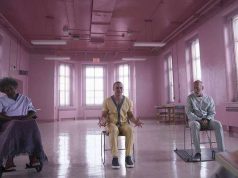There’s a lot of internal conflict in “The Brave One,” and I don’t just mean the main character’s psychological battles. The film itself seems unsure what it wants to do, working toward one point but undermining those efforts with contradictory messages. If it weren’t for the incisive, spot-on performances by Jodie Foster and Terrence Howard, these faults would be more troubling than they are. Somehow, Foster and Howard make it work.
Foster plays Erica Bain, a cozy New York public radio personality with a doctor fiance (Naveen Andrews) and a friendly German shepherd. One night in Central Park they are viciously attacked by a trio of thugs. When Erica wakes up in the hospital three weeks later, her fiance is dead and the dog is gone.
Erica’s life is a wreck now, and Foster’s performance and Neil Jordan’s exceptionally sharp direction bring it home. Her serene memories of making love with her fiance are now fragmented by memories of the attack. She is afraid of the city she once loved. We see the world from her perspective: off-balance, eerie, and surreal.
To regain a sense of security, she buys a gun. This is where the film starts to get tricky. Almost immediately after becoming armed, Erica finds herself the lone customer in a convenience store when a domestic dispute turns fatal. She has the opportunity to save her own life by taking someone else’s. She does it. She’s a killer now.
Jordan’s point (as he works from a screenplay by Roderick Taylor, Bruce A. Taylor, and Cynthia Mort) is expressed in Erica’s voice-over narration after she commits another act of vigilantism later on: “Why aren’t my hands shaking? Why doesn’t somebody stop me?” She can’t believe she’s killing people; what’s more, she’s terrified by how easy it is for her. The convenience store incident was a completely defensible act of desperation and necessity. The next one, not quite so much. The one after that, even less so. And so on.
The thing is, the convenience store drama feels like revenge fantasy wish-fulfillment. She can’t get back at the people who hurt her and her fiance, so she gets to take it out on some other lowlife. The film has been starkly realistic up to that point, and then it goes out on a limb with an event that is improbable and contrived.
If we’re meant to cheer for Erica every time she pumps some creep full of lead, that’s fine. You can make a movie like that. In fact, the all-moron screening audience I saw it with thought it WAS a movie like that. (They also seemed to think it was one of the funniest comedies of the year.) But the prevailing attitude in the film’s tone and substance is that Erica’s vigilantism is destroying her. Such actions change you, forever, and there’s no going back. This is not — or, rather, should not be — a feel-good film.
As I said, most of the film makes that point. Erica is haunted, conflicted, at times guilt-stricken, and Foster — with her expressive eyes and care-worn face often shown in close-up — fills the role with gravity. At one point she takes calls from listeners on her radio show, and she’s sickened to hear them praise the mysterious vigilante, whoever “he” is. (Everyone always assumes killers are men.) It’s heartbreaking to see her hate the idea of what she’s become even as she continues to indulge in it.
Most crucial are her scenes with Howard, who plays Det. Mercer, a cop with whom Erica becomes friendly and who is simultaneously investigating the vigilante killings. She asks him if he’s ever had to shoot someone. He has. “Did your hands shake?” she wants to know. “No,” he says. “That’s the benefit of being on the right side.” He’s not being cavalier. He really means that.
But if we’re not supposed to applaud Erica’s killing spree, then the finale is all wrong. She gets away with an awful lot — far more than is believable — for someone whose actions we’re not supposed to agree with. Jordan seems to want it both ways, to give us our rah-rahs when Erica plugs a thug, but to also remind us that such actions are disturbing. I don’t think it can work that way, but when the movie sticks to its guns (as it were), it’s an emotionally engaging and effective rumination on what it feels like to lose one’s sense of security.
B (2 hrs., 2 min.; )





